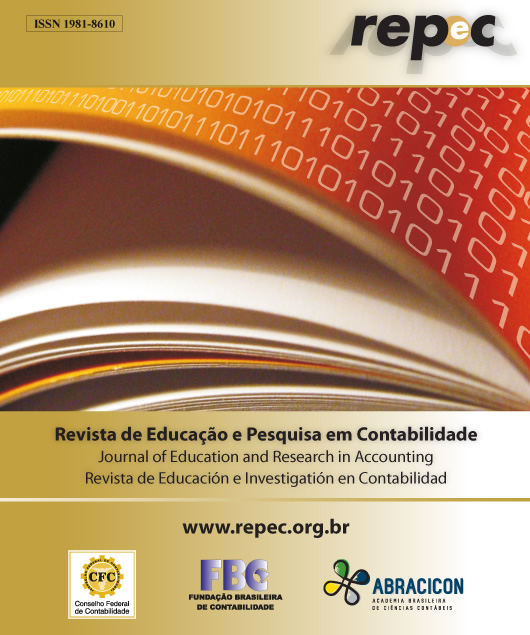PERCEPÇÃO DOS GRADUANDOS EM CIÊNCIAS CONTÁBEIS DE SALVADOR (BA) SOBRE OS CONCEITOS RELEVANTES DA TEORIA DA CONTABILIDADE
DOI:
https://doi.org/10.17524/repec.v6i2.176Palavras-chave:
Teoria da Contabilidade, Conceitos Contábeis Relevantes, Ensino de Contabilidade.Resumo
Um domínio apropriado dos conceitos básicos da Contabilidade e uma análise das suas características são essenciais para o desenvolvimento da Teoria Contábil. O processo de tomada de decisões financeiras exige o conhecimento de valores econômicos adequados, o que se torna cada vez mais demandado pelos usuários da Contabilidade. Este trabalho, portanto, buscou aferir a compreensão de alguns termos explorados no contexto da disciplina Teoria da Contabilidade, tais como ativos, passivos, goodwill, receitas, despesas, ganhos e perdas. Examinou-se uma amostra composta por 591 alunos matriculados em cursos de Ciências Contábeis que já haviam frequentado a disciplina Teoria da Contabilidade em instituições de ensino superior localizadas na cidade de Salvador (BA). A análise dos resultados por meio de uma regressão logística indica que a relação desempenho do discente e titulação do docente é mais significativa que a relação desempenho do discente e tipo da IES, contudo, de forma geral, conceitos superficiais sobre os tópicos tratados nesse trabalho foram citados em todos os níveis. Os resultados evidenciaram, em geral, falhas na compreensão de conceitos contábeis relevantes para a formação do aluno, refletindo majoritariamente uma visão superada ou, no mínimo, conservadora. Quando comparados por tipo de instituição de ensino, os resultados indicam que estudantes de instituições públicas possuem melhor domínio dos conceitos considerados neste estudo. A compreensão melhora um pouco mais quando a titulação do docente evolui de especialista para mestre e deste para doutor.Publicado
Como Citar
Edição
Seção
Licença
Copyright (c) 2012 Revista de Educação e Pesquisa em Contabilidade (REPeC)

Este trabalho está licenciado sob uma licença Creative Commons Attribution 4.0 International License.
Autores que publicam nesta revista concordam com os seguintes termos:
a) Autores mantém os direitos autorais e concedem à revista o direito de primeira publicação, com o trabalho simultaneamente licenciado sob a Licença Creative Commons Attribution 3.0 Unported License, que permite o compartilhamento do trabalho com reconhecimento da autoria e publicação inicial nesta revista. Esta licença permite que outros distribuam, remixem, adaptem ou criem obras derivadas, mesmo que para uso com fins comerciais, contanto que seja dado crédito pela criação original.
b) Não cabe aos autores compensação financeira a qualquer título, por artigos ou resenhas publicados na REPeC.
c) Os artigos e resenhas publicados na REPeC são de responsabilidade exclusiva dos autores.
d) Após sua aprovação, os autores serão identificados em cada artigo, devendo informar à REPeC sua instituição de ensino/pesquisa de vínculo e seu endereço completo.

